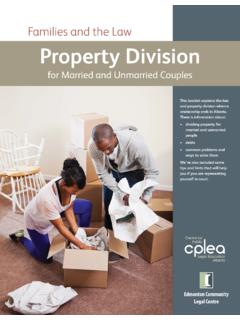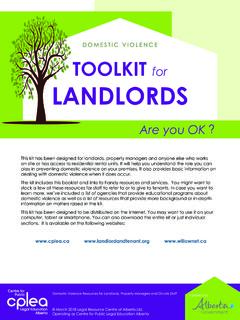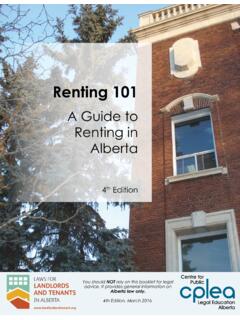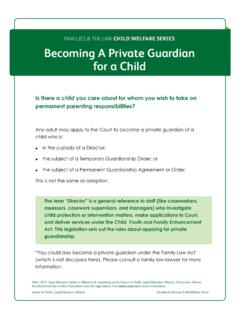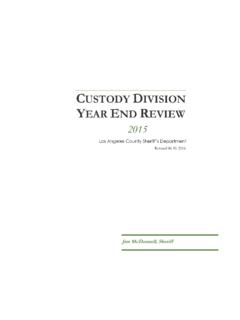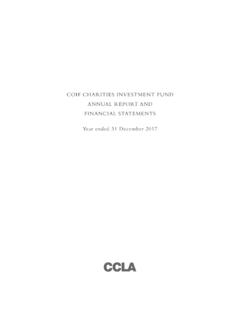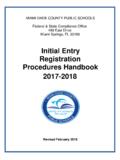Transcription of The Canadian Legal System - cplea.ca
1 The Canadian Legal System ACCESSING JUSTICE Series Legal Information for Frontline Service Providers This guide was developed for frontline service providers in Alberta who work with vulnerable individuals. It provides general Legal information on Alberta law only. This guide does not provide Legal advice. Last updated January 2016. The contents of this booklet are provided as general information only. This booklet does not contain Legal advice. If your client requires Legal advice, he or she should consult a lawyer. The information contained in this booklet was correct at the time it was produced. Be aware that there may have been subsequent changes which make the information outdated at the time you are reading it. Legal Resource Centre of Alberta will not be responsible for any loss arising from reliance on or action taken (or not taken) as a result of this information.
2 We would like to thank the Alberta Law Foundation for funding this project. #800, 10050-112 Street Edmonton, Alberta T5K 2J1. Phone Fax Email Web January 2016, Legal Resource Centre of Alberta Ltd., Edmonton, Alberta The Legal Resource Centre of Alberta, operating as the Centre for Public Legal Education Alberta, is a non-profit organization whose mission is to help people understand the law as it affects their everyday lives. We develop plain language booklets, presentations and other learning materials to help people recognize and respond to their Legal rights and responsibilities. We have a variety of programs, and provide Legal information and referral on many Legal topics. For more information, please go to Contents 1. Laws in 1. 1. Jurisdiction: Federal Law, Provincial Law, or Municipal Bylaw?
3 3. Common 6. 2. The Court System in 9. Provincial Court of 9. Court of Queen's Bench of Alberta Court of Supreme Court of Federal Courts & Provincial Administrative The Canadian Legal System Developing a general understanding of how Canada's Legal System functions will help you more effectively assist clients. It will enable you to better identify when a client has a Legal issue and make referrals to helpful Legal information sources or Legal services before the issue reaches a crisis stage. 1. Laws in Canada In Canada, our Legal System is made up of legislation and common law. Legislation Legislation consists of written rules created by elected officials from all levels of government. Statutes Statutes (also referred to as Acts), are written laws created by the government.
4 There is a rigorous review process that statutes go through before becoming law. Once a statute is passed, it is very difficult for it to be changed. Regulations Written rules that set out how a statute or act will function on a day-to-day basis. Regulations can be changed more easily than statutes, so they often address issues where changes are needed more often. Centre for Public Legal Education Alberta 1 Accessing Justice The Canadian Legal System Relationship between acts and regulations Statutes/Acts Regulations The Alberta Residential Tenancies Act The Residential Tenancies Ministerial states that a landlord can end a month- Regulation sets out the prescribed reasons to-month tenancy for one or more of the a landlord can end a month-to-month prescribed reasons (section 6(1)).
5 Tenancy (section 2(2)). This allows the government to more easily change, remove, or add to the list of reasons a landlord can terminate a tenancy. The Residential Tenancies Act states ..The Residential Tenancies Ministerial a landlord can end a month-to-month Regulation states the notice period to end tenancy if a building is being converted to a tenancy for condo conversion is now 365. a condominium. The Act states a landlord days not 180 days. This is the current state must give the tenant 180 days' notice to of law. end the tenancy (section 12(2). However . Why is this information important? The act or statute may not include all of the details your client needs to understand their Legal rights and responsibilities. The related regulation should be consulted along with the statute or act.)
6 The act or statute may not have the most current information included in it. The related regulation also needs to be consulted to find the most accurate and current information. Alberta's courthouse libraries ( ) can help clients find acts and regulations online or in print. However, they cannot interpret legislation for clients or tell them how it applies to their situation. Clients should seek Legal advice if they need help understanding how their Legal rights and obligations apply to their specific circumstances. Centre for Public Legal Education Alberta 2 Accessing Justice The Canadian Legal System Jurisdiction: Federal Law, Provincial Law, or Municipal Bylaw? In Canada, our acts and regulations are created by all levels of government.
7 Each government has specific responsibilities that are laid out in Canada's Constitution Act, 1867. Federal government All laws created by the federal government apply to all Canadians regardless of which province they live in. The Constitution Act, 1867 states that the federal government has responsibility for criminal law, immigration, marriage and divorce, and all Aboriginal matters, among other things. A complete list of all federal laws can be found online by visiting the Department of Justice Canada's Laws website: Provincial and territorial governments Laws created by provincial or territorial governments only apply to individuals living in or visiting that specific province or territory. For example, someone visiting from Ontario must follow the rules under Alberta's Traffic Safety Act.
8 Provinces and territories are responsible for creating laws around renting, driving, employment, and wills and estates, among other things. For a complete list of Alberta legislation, visit the Queen's Printer website: Municipal bylaws Provincial and territorial governments have the power to give certain law-making responsibilities to cities, towns, and other municipalities. Laws created by municipal governments are called bylaws. In Alberta, municipal governments can make bylaws related to public behaviour, use of public space, panhandling, graffiti, land use, and public transit. To find out what bylaws apply in your municipality, contact your local bylaw enforcement office or municipal administrator. Centre for Public Legal Education Alberta 3 Accessing Justice The Canadian Legal System Jurisdictional chart: Who's responsible?
9 This chart lists some of the most common Legal issues your clients may experience and which level of government is responsible for creating the laws around these issues. Legal Issue Jurisdiction Related Legislation Criminal Offences & Fines Criminal law Federal Criminal Code, Controlled Drugs and Substances Act, Youth Criminal Justice Act Driving Provincial Traffic Safety Act Fine Options & Alternative Provincial Corrections Act Fine Options Order Measures Program Alternative Measures Program must comply with Criminal Code but is administered by the Government of Alberta Panhandling Municipal Municipalities are responsible for creating rules around panhandling check with your local bylaw office Public intoxication Provincial Gaming and Liquor Act Employment & Consumer Issues Collections agencies Provincial Fair Trading Act Collection and Debt Repayment Practices Regulation Employment Provincial Employment Standards Code Payday loans Provincial Fair Trading Act Payday Loans Regulation Family Law Child custody and parenting If a client is married
10 Federal Divorce Act (married couples only). If a client is not married Provincial Family Law Act (married and unmarried couples). Child and spousal support If a client is married Federal Divorce Act (married couples only). If a client is not married Provincial Family Law Act (married and unmarried couples). If support is not being paid Provincial Maintenance Enforcement Act Domestic violence Criminal offences Federal Criminal Code Protection orders Provincial Protection against Family Violence Act Property division after Provincial Matrimonial Property Act (married couples only). relationship breakdown Child Welfare Provincial Child, Youth and Family Enhancement Act Centre for Public Legal Education Alberta 4 Accessing Justice The Canadian Legal System Legal Issue Jurisdiction Related Legislation Housing Renting problems Provincial Residential Tenancies Act Maintenance of rental properties Provincial Public Health Act Minimum Housing & Health Standards Secondary suites Municipal Each municipality will have its own bylaw around land use that will include rules about secondary suites Human Rights Fundamental freedoms, Federal Canadian Charter of Rights and Freedoms democratic rights, Legal rights Protection from discrimination Provincial Alberta Human Rights Act in employment, rental housing.
